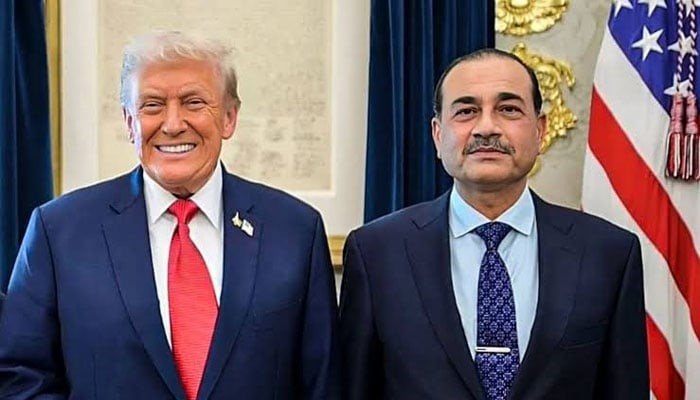Donald Trump’s praise for Pakistan’s Field Marshal Asim Munir marks a sharp US policy shift, cooling ties with India and boosting Islamabad’s strategic standing.

News Desk
WASHINGTON: US president Donald Trump appeared to have redrawn the contours of America’s South Asia policy, pivoting away from his once-celebrated camaraderie with Indian Prime Minister Narendra Modi toward a strikingly cordial relationship with Pakistan’s military leadership.
According to political analyst Fareed Zakaria, Trump’s renewed focus on Pakistan – particularly on Field Marshal Asim Munir – marked a “sudden and dramatic” reversal of his earlier stance. Speaking on CNN, Zakaria said Trump seemed “enamoured” with Pakistan’s top general, describing the shift as a clear signal of changing priorities in Washington’s power calculus.
Zakaria noted that the former president, who had spent much of his previous tenure championing strategic and economic ties with India, had recently gone out of his way to praise Munir. During a conference in Egypt, Trump reportedly referred to him as his “favourite field marshal,” an unusual term of endearment that reflected both admiration and a desire for renewed partnership.
The tone of Trump’s remarks suggested not only a personal rapport but also the possibility of a broader thaw in relations between Washington and Islamabad. Analysts observed that the recent months had already seen encouraging signs of cooperation, particularly in the economic domain. In July, the US and Pakistan signed a new tariff agreement and pledged joint efforts to develop Pakistan’s oil reserves – a move widely interpreted as a sign of restored confidence in the South Asian country’s potential.
“The United States has come to realise that Pakistan is an effective military partner,” Zakaria said, suggesting that the shift was rooted less in sentimentality and more in strategic calculation. The growing warmth had, in turn, influenced other regional players. Saudi Arabia, impressed by Pakistan’s military discipline and operational capacity, recently finalised a defence pact with Islamabad, further underlining Pakistan’s expanding diplomatic footprint.
For many observers, the development represented a pragmatic recalibration by Trump – a leader known for his transactional style of diplomacy. His tilt towards Pakistan seemed to blend strategic opportunism with a recognition of Pakistan’s emerging role in regional stability. It also hinted at a cooling of his earlier enthusiasm for Modi, whose relationship with Trump had once symbolised a new axis in US-India ties.
The shift underscored the fluid nature of global alliances, where personal preferences, security imperatives, and economic interests often intersect. If sustained, Trump’s apparent admiration for Field Marshal Munir could reshape the balance of influence in South Asia, bringing Pakistan back into sharper focus in the corridors of Washington power.


